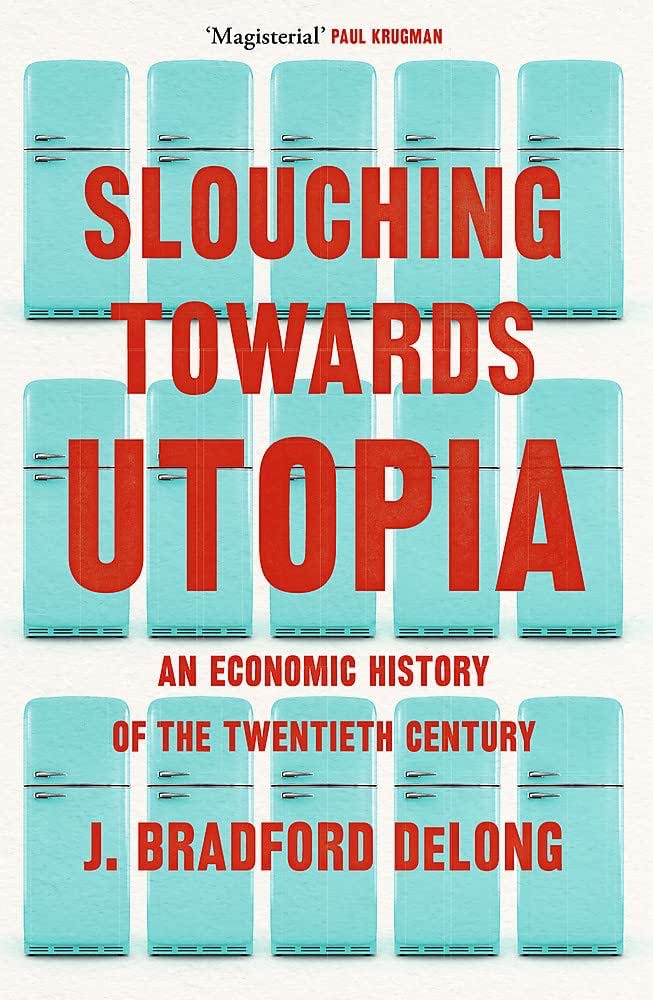"Slouching Towards Utopia": Excerpt at þe Milken Review
A solid piece of the introduction...
Buy Slouching Towards Utopia <bit.ly/3pP3Krk>
Excerpt at The Milken Review: <https://www.milkenreview.org/articles/slouching-towards-utopia>
Slouching Towards Utopia
by j. bradford delong
If you are not an economist, the most likely place you’ve run across J. Bradford DeLong is his always-smart blog, Grasping Reality. Within the profession, though, Brad is known as an economist’s economist, whose specialty is, well, non-specialty. He was deputy assistant secretary for economic affairs in the Clinton administration, which translated to alter ego for another polymath, Treasury Secretary Larry Summers. And since returning to academia (University of California, Berkeley), he’s been delivering wisdom on topics ranging from China to the political economy of democracy.
Slouching Towards Utopia: An Economic History of the Twentieth Century* is the essence of Brad, a far-reaching examination of economic growth since 1870 with numerous digressions along the way. Annie Lowrey of The Atlantic called it “sweeping and detailed, learned and accessible, familiar and strange — a definitive look at how we arrived at such material splendor and how it failed to deliver all that it seemed to promise.” Couldn’t have put it better myself. Here, we offer a look at the introductory chapter.
— Peter Passell
Published April 21, 2023
* Copyright J. Bradford DeLong. Basic Books (2022). All rights reserved.
What I call the “long 20th century” started with the watershed-crossing events of around 1870 — the triple emergence of globalization, the industrial research lab and the modern corporation — which ushered in changes that began to pull the world out of the dire poverty that had been humanity’s lot for the previous 10,000 years since the discovery of agriculture. And what I all the “long 20th century” ended in 2010, with the world’s leading economic edge, the countries of the North Atlantic, still reeling from the Great Recession that had begun in 2008, and thereafter unable to resume economic growth at anything near the average pace that had been the rule since 1870. The years following 2010 were to bring large system-destabilizing waves of political and cultural anger from masses of citizens, all upset in different ways and for different reasons at the failure of the system of the 20th century to work for them as they thought it should.
In between, things were marvelous and terrible, but by the standards of all of the rest of human history, much more marvelous than terrible. The 140 years from 1870 to 2010 of the long 20th century were, I strongly be-lieve, the most consequential years of all humanity’s centuries. And it was the first century in which the most important historical thread was what anyone would call the economic one, for it was the century that saw us end our near-universal dire material poverty.
My certainty that history should focus on the long 20th century stands in contrast to what others — most notably the Marxist Brit-ish historian Eric Hobsbawm — have focused on and called the “short 20th century,” which lasted from the start of World War I in 1914 to the fall of the Soviet Union in 1991. Such others tend to see the 19th century as the long rise of democracy and capitalism from 1776 to 1914, and the short 20th century as one in which socialism and fascism shook the world.
Histories of centuries, long or short, are by definition grand narrative histories, built to tell the author’s desired story. Setting the years 1914-1991 apart as a century makes it easy for Hobsbawm to tell the story he wants to tell. But it does so at the price of missing much of what I strongly believe is the bigger, more important story. It is the one that runs from about 1870 to 2010, from humanity’s success in unlocking the gate that had kept it in dire poverty up to its failure to maintain the pace of the rapid upward trajectory in human wealth that the earlier success had set in motion.
What follows is my grand narrative, my version of what is the most important story to tell of the history of the 20th century. It is a primarily economic story. It naturally starts in 1870. I believe it naturally stops in 2010.
Jekyll and Hyde
As the genius, Dr. Jekyll-like, Austro-English- Chicagoan moral philosopher Friedrich August von Hayek observed, the market economy “crowdsources” — incentivizes and coordinates at the grassroots — solutions to the problems it sets. Back before 1870, humanity did not have the technologies or the organizations to allow a market economy to pose the problem of how to make the economy rich. So even though humanity had had market economies, or at least market sectors within its economies, for thousands of years before 1870, all that markets could do was to find customers for producers of luxuries and conveniences, and make the lives of the rich luxurious and of the middle-class convenient and comfortable…
Read more of the excerpt at The Milken Review: <https://www.milkenreview.org/articles/slouching-towards-utopia>



